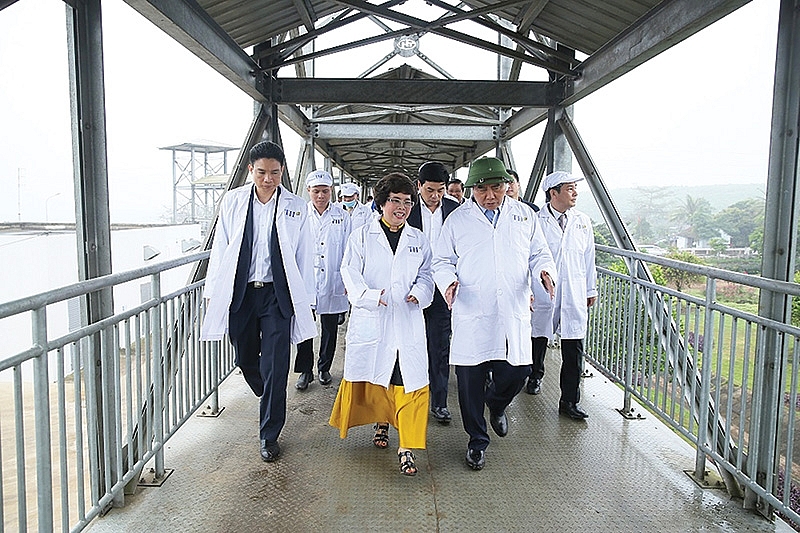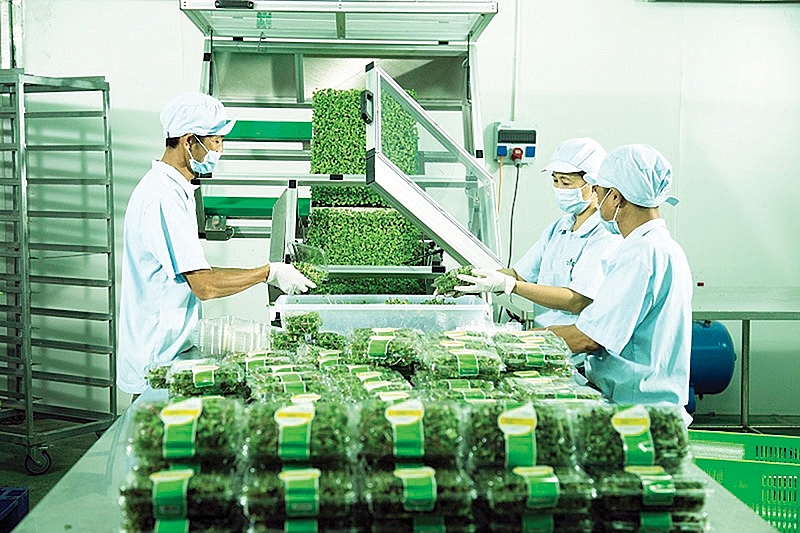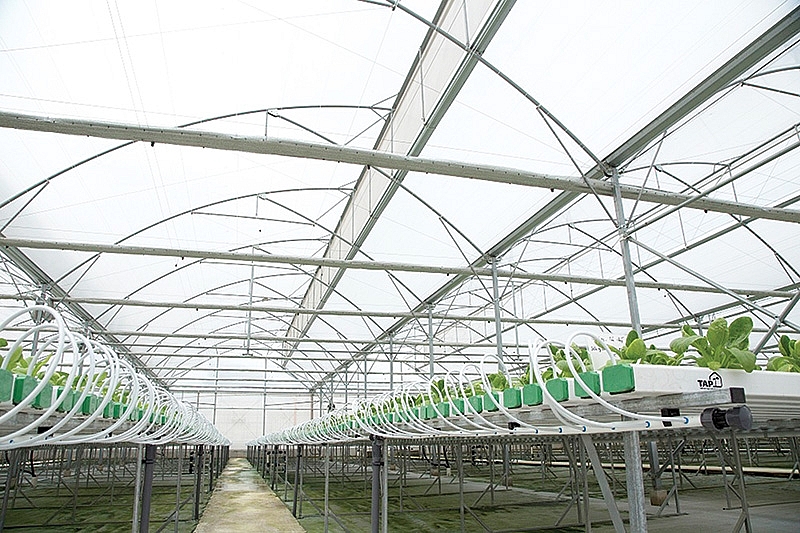New support for agriculture yields results
 |
| Prime Minister Nguyen Xuan Phuc (right, first row) paid a visit to the dairy farm of TH Group in Nghe An province |
In late March 2019, Truong Hai Automobile Company (THACO) launched four projects in Chu Lai Economic Zone in the central province of Quang Nam. One of those ventures, with the total investment of VND8.1 trillion ($352 million), will be deployed across 451 hectares over five years for fruit and post-harvest processing, production of agricultural materials, wood storage, and furniture manufacturing there.
As a major domestic group with more than 20 years working in manufacturing, distributing, and providing maintenance services, in 2017, THACO started investing in agriculture, responding to the government’s call on developing agriculture as one of the key industries of the country.
According to THACO’s CEO Tran Ba Duong, the move aims to transform the company into a multiple-industry group in which agriculture becomes one of five development pillars.
Before the agricultural project in Chu Lai, THACO began operations in February 2019 with the construction of an industrial zone specialised in agriculture in Quynh Phu district of the northern province of Thai Binh.
The group will invest VND7.8 trillion ($339 million) from now until 2021 on the 194ha zone to help promote exports and serve the domestic demand.
THACO is not the only major group to move into agriculture. In 2015, Vingroup expanded operations with VinEco. So far, VinEco has been one of the pioneers in applying world-leading agricultural technologies such as the drip irrigation system, sprinkling technology, and glasshouse technology.
Covering an area of 5.5ha, the greenhouse at VinEco’s Tam Dao farming complex is one of the typical farms battling climate change in Binh Xuyen district of the northern province of Vinh Phuc. This greenhouse is home to assorted vegetables.
The use of automatic irrigation systems based on weather sensors in accordance with Israel’s modern technology helps the farm produce a variety of vegetables in a flexible manner, without depending on the weather.
Avner Shohet, expert from Israel’s agricultural technological maker TAP Group, told VIR, “This is the most advanced technology in the world, not just in Vietnam. We do not pollute the land, the water is recycled and we follow a self-contained process. This system is friendly with environment, and with it, we can save water and fertiliser by 70 per cent.”
Meanwhile, according to Lai Duc Luu, a team leader at VinEco, the greenhouse is producing hydroponic vegetables using narrow field telescope film techniques. “With this tech, it is possible to produce off-season vegetables with very high efficiency that the normal fields can not produce,” he said.
According to Luu, they can now control the temperature, humidity, and light. “When it rains, the sensor system will inform of the situation before the roof system automatically deploys a nylon covering, reducing the impact of rain. When the wind is strong, sensors control the roof to close down.”
With such 15 farms which link around 1,000 farming households and co-operatives, VinEco’s agricultural products have been distributed in over 100 VinMart supermarkets, over 1,800 VinMart+ convenience stores, and exported to European markets.
Meanwhile, PAN Farm under The PAN Group has also greatly contributed to development of hi-tech agriculture by helping farmers on their own farms.
“We co-operate and facilitate farmers to get benefits from their own land by technologies and high-quality plant breedings that we provide,” said Nguyen Thi Tra My, CEO of PAN Farm.
According to My, the priority of The PAN Group is supporting Vietnam’s agriculture in planting trees with good productiveness, effectiveness and ability of adapting to climate and environment change.
“In order to ensure the high quality of crops such as chrysanthemums in Dalat to be exported to Japan, high-tech melon or fragrant rice varieties in provinces across the country, PAN Farm is currently focussing on building standard models on a moderate land area. All must be ensured strictly about seed quality, standard farming model, and irrigation,” My told VIR.
Accompanying with PAN Farm since the early day, the International Finance Corporation (IFC) has been one of their biggest shareholders in the private company.
“With IFC’s support, the standards of food safety, the environment, and society will catch up with international practice and contribute to leveraging the industry’s standard in Vietnam,” My added.
Meanwhile, in the central province of Quang Nam, T&T Group will oversee a venture with the total investment of over VND3.3 trillion ($143 million) on 278ha, divided into three stages spread over 50 years.
The project will create a planting area applying high technologies to produce goods, and grow flowers and vegetables on a large scale.
 |
 |
Hi-tech farm households
While enterprises are heavily investing in agricultural projects, many small-scale businesses and farm households are also following suit, with the application of high technology in their production.
For example, Thuy Thien Nhu JSC, which manages the ORFARM food processing and distribution chain, has applied Japanese technology in agriculture since 2012, saving costs, ensuring quality, and protecting the environment.
“With this support, we need only two people instead of 10 or 12 to take care of 1,000 pigs,” Bui Bich Lien, CEO of the company, told VIR.
In the cases of employees leaving a job, the enterprise can now get someone else to operate the predetermined processes without having to train workers and disturb the system. “This helps us minimise the negative impacts of the sudden change of personnel,” Lien added.
Aware of the importance and responsibility to environment, Thuy Thien Nhu began to apply EM Green technology. Lien said, “EM enhances the diversity of micro-organisms. Healthy soil and clean water are maintained by the diversity and balance of the community of micro-organisms within them.”
Meanwhile, in the Mekong Delta, where salinity intrusion badly impacts on life and farming, people are also active in using tech to adapt to climate change.
Truong Van Thanh and many other farmers in Luong Hoa A commune of Chau Thanh district in Tra Vinh province now find farming easier, even in the dry season.
In the past, farmers were forced to spend whole days in the field simply to get water, but now with a mobile phone and water monitoring apps they can know exactly how salty the water is without tasting or using other traditional methods, and easily pump water for their farms.
“The app helps us easily know the exact water level, salt levels, and PH levels. I can now even pump water when I go out elsewhere with friends,” Thanh said.
Over the last two years, people in the Mekong Delta have been using smart fertilisers for their rice.
“A dose of this fertiliser is planted along with each young rice stalk by a machine. It helps save expenses, human work, and improves productivity by 20 to 30 per cent,” Thanh added.
Also affected by climate change, people in the Central Highlands often suffer from drought. As a coffee farmer in Quang Hiep commune in the Central Highlands province of Dak Lak, Tran Van Nhien has used a hi-tech irrigation system for nearly two years.
“I use drip protection for 250 coffee trees. I now see my trees growing healthier and taller compared to using traditional methods. Importantly, I can reduce costs and manage residues,” Nhien said.
The drip irrigation system used by Nhien is part of support from a German group with effective solutions for crop and animal health.
In 2016, recognising the ageing of Vietnam’s coffee locations resulting in 30 to 40 per cent decrease in yield, the company has implemented a programme helping farmers successfully replant the trees.
With the company’s measure, water and plant protection solutions are distributed around fields through the drip irrigation system and delivered directly to the roots of the plants.
Satellite imagery, application algorithms, hi-tech sensors, phone applications, and GPS devices will be used to assist farms in making decisions on pests, floods, droughts, and risk management through the seasons.
Strategic economic lever
Addressing a recent ceremony for exporting the first fruit shipment from THACO’s Chu Lai Port, Prime Minister Nguyen Xuan Phuc said that developing smart agriculture can be a strategic lever for the Vietnamese economy in the trend of the Fourth Industrial Revolution.
“Deep processing is the key to enhancing value and ensuring effective and sustainable development,” he said.
On a previous visit to Dong Giao Foodstuff Export JSC in Tam Diep of the northern province of Ninh Binh, PM Phuc emphasised the importance of application of high technologies in agriculture.
“If we can use the land as effectively as Dong Giao does, meaning one hectare of land of Dong Giao can now bring in VND250 million ($10,869) per year, we can therefor fetch $300 billion per year nationwide. If we make bigger efforts to earn up to VND500 million ($21,739) per hectare, we will be able to earn $600 billion per year throughout the country,” PM Phuc said.
He also proposed the Vietnam’s agriculture to strongly apply sensor technology, automotive robots, unmanned aircraft, Big Data, cloud computing, as well as the Internet of Things.
“Smart agriculture can completely become a strategic lever for Vietnam to fulfil its goals: to become an economy with a high average income before 2035, to become a fair and equal society full of cultural identity, and to become a sustainable rural agricultural environment,” PM Phuc said.
Meanwhile, addressing a sideline event during the visit of Dutch Prime Minister Mark Rutte to Vietnam recently, Nguyen Xuan Cuong, Minister of Agriculture and Rural Development, said that the private sector plays an important role in innovation, including in the agricultural sector.
“Vietnam welcomes and facilitates all foreign and domestic investors in the agricultural sector, so that it can reach the top 15 of the most developed agricultural nations in the world,” Cuong said.
What the stars mean:
★ Poor ★ ★ Promising ★★★ Good ★★★★ Very good ★★★★★ Exceptional
Themes: Unleashing The Private Sector
Related Contents
Latest News
More News
- Vietnam sets ambitious dairy growth targets (February 24, 2026 | 18:00)
- Masan Consumer names new deputy CEO to drive foods and beverages growth (February 23, 2026 | 20:52)
- Myriad risks ahead, but ones Vietnam can confront (February 20, 2026 | 15:02)
- Vietnam making the leap into AI and semiconductors (February 20, 2026 | 09:37)
- Funding must be activated for semiconductor success (February 20, 2026 | 09:20)
- Resilience as new benchmark for smarter infrastructure (February 19, 2026 | 20:35)
- A golden time to shine within ASEAN (February 19, 2026 | 20:22)
- Vietnam’s pivotal year for advancing sustainability (February 19, 2026 | 08:44)
- Strengthening the core role of industry and trade (February 19, 2026 | 08:35)
- Future orientations for healthcare improvements (February 19, 2026 | 08:29)

 Tag:
Tag:




















 Mobile Version
Mobile Version